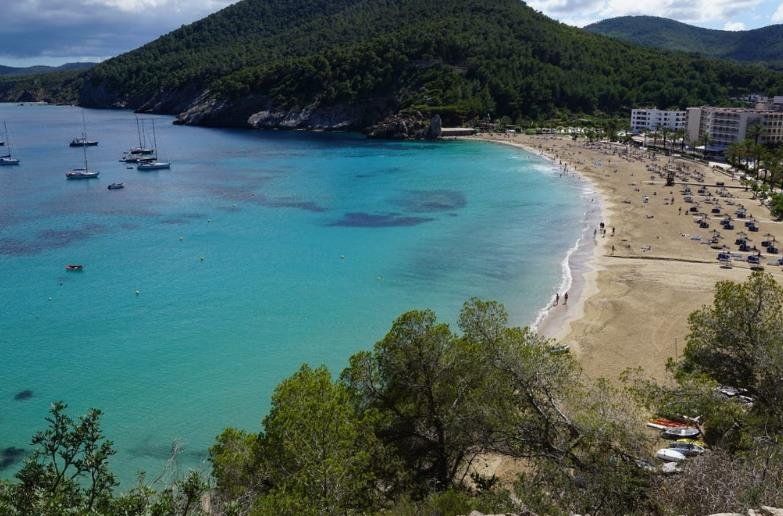Europe is home to some of the most popular and crowded beach destinations in the world, such as Spain, France, Italy, and Greece. However, there is one country that offers stunning and diverse coastal scenery, without the hassle and the crowds of mass tourism. That country is Portugal, and it is one of the best-kept secrets in Europe.
Portugal has a coastline of over 1,800 kilometres, stretching from the Atlantic Ocean to the Mediterranean Sea. Along this coastline, there are countless beaches, coves, cliffs, islands, and lagoons, each with its own charm and character. Whether you are looking for sandy beaches, rocky shores, calm waters, or wild waves, you will find it in Portugal.

Some of the most beautiful and famous beaches in Portugal are located in the Algarve region, in the south of the country. Here, you can enjoy the golden sands and turquoise waters of Praia da Marinha, Praia da Rocha, and Praia da Dona Ana, among others. You can also explore the stunning rock formations and caves of Ponta da Piedade, Benagil, and Algar Seco, which are best accessed by boat or kayak.
However, the Algarve is not the only place where you can find amazing beaches in Portugal. In the central and northern regions, there are also many hidden gems that are worth discovering. For example, you can visit the wild and rugged beaches of Costa Vicentina, such as Praia do Amado, Praia da Arrifana, and Praia do Malhão, which are ideal for surfing and hiking. You can also enjoy the scenic and serene beaches of Costa de Prata, such as Praia da Nazaré, Praia de São Martinho do Porto, and Praia da Foz do Arelho, which are perfect for relaxing and swimming.
Portugal’s culture: A rich and diverse heritage
Portugal is not only a paradise for beach lovers, but also for culture enthusiasts. The country has a long and fascinating history, dating back to the ancient times of the Romans, the Moors, and the Celts. The country also has a strong maritime tradition, as it was one of the pioneers of the Age of Discovery, exploring and colonizing new lands around the world.
The result of this history is a rich and diverse cultural heritage, which is reflected in the architecture, art, music, cuisine, and traditions of Portugal. You can admire the stunning examples of Romanesque, Gothic, Manueline, Baroque, and Modernist styles in the monuments and buildings of Portugal, such as the Jerónimos Monastery, the Belém Tower, the Pena Palace, and the Casa da Música. You can also marvel at the unique and colourful tiles, or azulejos, that decorate the walls and floors of churches, palaces, and houses, as well as the intricate and delicate filigree jewellery, made of gold and silver.
You can also immerse yourself in the music and dance of Portugal, especially the fado, the melancholic and soulful genre that expresses the feelings and emotions of the Portuguese people. You can listen to the fado singers, or fadistas, in the traditional taverns and cafes, or casas de fado, especially in the districts of Alfama and Bairro Alto in Lisbon, and Ribeira in Porto. You can also enjoy the lively and festive folk dances, such as the rancho folclórico, the vira, and the malhão, which are performed in colourful costumes and accompanied by instruments such as the accordion, the guitar, and the tambourine.
You can also taste the delicious and diverse cuisine of Portugal, which is influenced by the sea, the land, and the different regions and cultures of the country. You can savour the fresh and succulent seafood, such as the bacalhau (cod), the sardines, the clams, and the octopus, prepared in various ways, such as grilled, baked, or stewed. You can also try the hearty and flavourful meat dishes, such as the cozido à portuguesa (a stew of various meats and vegetables), the leitão à bairrada (a roasted suckling pig), and the francesinha (a sandwich of ham, cheese, and steak, covered with a spicy sauce). You can also indulge in the sweet and sinful desserts, such as the pastéis de nata (custard tarts), the queijadas de Sintra (cheese cakes), and the ovos moles de Aveiro (egg yolk and sugar candies).
Portugal’s tourism: A sustainable and responsible approach
Portugal is a country that values and respects its natural and cultural heritage, and strives to preserve and protect it for the future generations. The country also aims to promote and develop a sustainable and responsible tourism, that benefits both the visitors and the locals, and that minimizes the negative impacts on the environment and the society.
One of the ways that Portugal does this is by implementing and supporting various initiatives and projects that foster the conservation and the enhancement of its natural and cultural resources. For example, the country has created and expanded several natural parks and reserves, such as the Parque Natural da Arrábida, the Parque Natural da Ria Formosa, and the Parque Natural do Douro Internacional, where you can enjoy the biodiversity and the beauty of the flora and fauna, as well as the activities and the services that are offered in harmony with nature. The country also has restored and rehabilitated many of its historical and architectural landmarks, such as the Castelo de São Jorge, the Convento do Carmo, and the Palácio Nacional de Mafra, where you can learn and appreciate the history and the culture of the country, as well as the events and the exhibitions that are organized in these venues.
Another way that Portugal does this is by encouraging and facilitating the participation and the involvement of the local communities and the stakeholders in the tourism sector. For example, the country has developed and promoted various forms of alternative and authentic tourism, such as rural tourism, ecotourism, and cultural tourism, where you can experience and interact with the local people, their traditions, and their lifestyles, as well as support their economy and their development. The country also has established and strengthened various networks and partnerships among the public and the private entities, such as the Turismo de Portugal, the Associação de Turismo de Lisboa, and the Associação de Turismo do Porto e Norte, where you can find and access the information and the resources that you need to plan and enjoy your trip to Portugal, as well as to contribute and give feedback to the improvement and the quality of the tourism services and products.
















